Hiv genome - Study guides, Class notes & Summaries
Looking for the best study guides, study notes and summaries about Hiv genome? On this page you'll find 764 study documents about Hiv genome.
Page 4 out of 764 results
Sort by
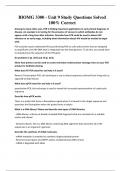
-
BIOMG 3300 - Unit 9 Study Questions Solved 100% Correct
- Exam (elaborations) • 9 pages • 2024
-
- $12.10
- + learn more
Among its many other uses, PCR is finding important applications in early clinical diagnosis of disease. An example is in testing for the presence of viruses to which antibodies do not appear until a long time after infection. Describe how PCR could be used to detect HIV infection at an early stage, including what information about HIV would be needed to begin with. PCR could be used to detected HIV by performing PCR on cells with primers that are designed to amplify the viral HIV DNA that...
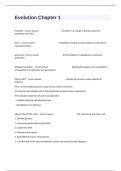
-
Evolution Chapter 1 Actual Real Practice Exam Questions And Answers Graded A+.
- Exam (elaborations) • 12 pages • 2024
- Available in package deal
-
- $13.49
- + learn more
Evolution - correct answer Evolution is a change in the gene pool of a population over time. Gene - correct answer a hereditary unit that can be passed on unaltered for many generations gene pool - correct answer all of the alleles in a population in particular generation Biological evolution: - correct answer ...
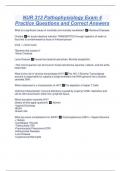
-
NUR 313 Pathophysiology Exam 4 Practice Questions and Correct Answers
- Exam (elaborations) • 12 pages • 2024
-
- $8.99
- + learn more
What is a significant cause of morbidity and mortality worldwide? Infectious Diseases Cholera An acute intestinal infection TRANSMITTED through ingestion of water or food that is contaminated by feces of infected person. (Oral --> fecal route) *Bacteria that causes it* -Vibrio Cholerae Lyme Disease Caused by bacterial spirochete: Borrelia burgdorferi. -This microorganism can be found in forest animals like squirrels, rodents, and the white tailed deer. What is the role of reverse transc...

-
NURS 497 Midterm 1 Exam - Complete Solutions (Answered)
- Exam (elaborations) • 61 pages • 2024
- Available in package deal
-
- $28.49
- + learn more
NURS 497 Midterm 1 Exam - Complete Solutions (Answered) What kind of pathogen is HIV? Blood borne pathogen How is HIV transmitted? Blood or blood products IV medication abuse Both heterosexual and homosexual activity Maternal-child transmission before or during childbirth What cells does HIV infect and destroy? CD4-positive T-helper cells What are CD4+ helper T cells necessary for? Development of both plasma cells and T-cytotoxic cells What kind of virus is HIV? A retrovirus with the ability t...
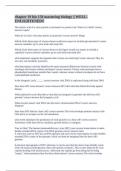
-
chapter 19 bio 150 mastering biology || WELL-ENLIGHTENED!!
- Exam (elaborations) • 2 pages • 2024
- Available in package deal
-
- $7.99
- + learn more
The nucleic acid of a virus particle is enclosed in a protein coat. What is it called? correct answers capsid What do we call a virus that attacks a bacterium? correct answers Phage Which of the three types of viruses shown would you expect to include glycoproteins? correct answers reminder: go to your book and study this Which of the three types of viruses shown in the figure would you expect to include a capsid(s)? correct answers reminder: go to your book and study this what state...
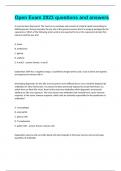
-
Open Exam 2023 questions and answers
- Exam (elaborations) • 16 pages • 2024
-
- $15.49
- + learn more
A virus has been discovered. The virus has no envelope and consists of a helical capsid surrounding its dsDNA genome. During assembly, the pac site of the genome ensures that it is properly packaged by the capsomeres. Which of the following amino acids is/are expected to be on the capsomere domain that interacts with the pac site? A. lysine B. methionine C. glycine D. arginine E. A and D Answer: A and D Explanation: DNA has a negative charge, so positively charged amino acids, such as...
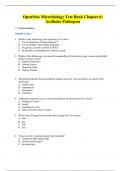
-
OpenStax Microbiology Test Bank Chapter 6: Acellular Pathogens
- Exam (elaborations) • 14 pages • 2024
- Available in package deal
-
- $16.50
- + learn more
OpenStax Microbiology Test Bank Chapter 6: Acellular Pathogens * = Correct answer Multiple Choice 1. Which of the following is not a property of a virus? A. It is an infectious cellular pathogen.* B. It is an obligate intracellular pathogen. C. Its genome consists of DNA or RNA. D. Its genome is surrounded by a protein capsid. 2. Which of the following is the scientist responsible for first discovering viruses (specifically, tobacco mosaic virus)? A. Dimitri Ivanovski* B. Edward Jen...
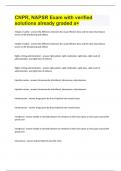
-
CNPR, NAPSR Exam with verified solutions already graded a+
- Exam (elaborations) • 97 pages • 2024
- Available in package deal
-
- $15.49
- + learn more
Drug Discovery • Unlike small molecule drugs (pharmaceuticals), large molecule drugs (biopharmaceuticals) are mainly protein-based o These protein-based drugs are similar to natural biological compounds found in human body or they're fragments that mimic active part of natural compounds Discovery of Pharmaceuticals commences w/ scanning hundreds of compounds, whether w/ actual materials (irrational approach) or virtual simulations (rational approach) • Pharmaceuticals are new che...
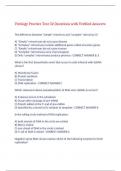
-
Virology Practice Test 32 Questions with Verified Answers,100% CORRECT
- Exam (elaborations) • 7 pages • 2024
-
- $10.49
- + learn more
Virology Practice Test 32 Questions with Verified Answers The difference between "simple" retrovirus and "complex" retrovirus is? A) "Simple" retroviruses do not cause disease B) "Complex" retroviruses contain additional genes called accessory genes C) "Simple" retroviruses do not cause tumors D) "Complex" retroviruses carry viral oncogene E) Only "complex" retroviruses produce provirus - CORRECT ANSWER B, E What is the first biosynthetic event that occurs in cells i...
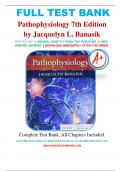
-
Pathophysiology 7th Edition By Jacquelyn Banasik ISBN: 9780323761550 Chapter 1-54 Complete Guide-TEST BANK
- Exam (elaborations) • 154 pages • 2024
-
- $19.99
- + learn more
Test Bank For Pathophysiology 7th Edition By Jacquelyn Banasik. 1. Introduction to Pathophysiology 2. Homeostasis, Allostasis, and Adaptive Responses to Stressors 3. Cell Structure and Function 4. Cell Injury, Aging, and Death 5. Genome Structure, Regulation, and Tissue Differentiation 6. Genetic and Developmental Disorders 7. Neoplasia 8. Infectious Processes 9. Inflammation and Immunity 10. Alterations in Immune Function 11. Malignant Disorders of White Blood Cells 12. HIV Disease and AIDS 13....

Study stress? For sellers on Stuvia, these are actually golden times. KA-CHING! Earn from your study resources too and start uploading now. Discover all about earning on Stuvia


